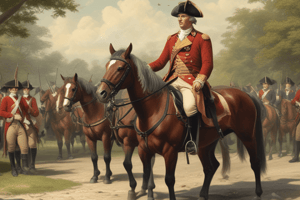Podcast
Questions and Answers
What do the people possess the only security against in the taxation context?
What do the people possess the only security against in the taxation context?
A burdensome taxation.
The General Assembly of Virginia has the exclusive right to lay taxes upon its inhabitants.
The General Assembly of Virginia has the exclusive right to lay taxes upon its inhabitants.
True (A)
What is declared to be null and void in the document concerning the power of the British Parliament over the colonies?
What is declared to be null and void in the document concerning the power of the British Parliament over the colonies?
All resolutions, votes, orders, and proceedings denying the authority of Parliament.
The Creator endows all men with certain unalienable rights, among them are Life, Liberty, and the pursuit of ______.
The Creator endows all men with certain unalienable rights, among them are Life, Liberty, and the pursuit of ______.
According to the declaration, what is the duty of the people when a government becomes destructive?
According to the declaration, what is the duty of the people when a government becomes destructive?
The document portrays the King of Great Britain as a tyrant.
The document portrays the King of Great Britain as a tyrant.
What is necessary before a people declare separation from another?
What is necessary before a people declare separation from another?
What action has been taken repeatedly by the colonies that was met with injury?
What action has been taken repeatedly by the colonies that was met with injury?
Flashcards are hidden until you start studying
Study Notes
Virginia's Stance on Taxation (Doc. 1)
- The House of Burgesses of Virginia asserted that only the people, or their elected representatives, should tax them. This ensures taxes are bearable and aligns with British freedom.
- The Virginia General Assembly holds the sole right to tax its inhabitants. Any attempt to grant this power to others threatens British and American liberty.
The Stamp Act and its Impact (Doc. 2)
- Document 2 references "An Emblem of the Effects of the STAMP," suggesting visual propaganda was utilized to warn about the detrimental consequences of the Stamp Act. This is evidenced only by title and source; further detail is not provided.
British Parliamentary Authority (Doc. 3)
- The Declaratory Act declared that the American colonies are, and always have been, subordinate to the British crown and Parliament.
- The British Parliament possesses the authority to create laws binding the American colonies.
- Any colonial action questioning Parliament's lawmaking power is declared null and void.
The Declaration of Independence (Doc. 4)
- The Declaration of Independence outlines the reasons for the American colonies' separation from Great Britain.
- It asserts the self-evident truths of equality, unalienable rights (life, liberty, and the pursuit of happiness), and the right to alter or abolish a government that becomes destructive of these ends.
- It accuses the King of Great Britain of a long train of abuses and usurpations aimed at establishing tyranny over the colonies.
- Repeated petitions for redress were answered only with repeated injury.
- The Declaration declares that the united colonies are, and of right ought to be, free and independent states.
Studying That Suits You
Use AI to generate personalized quizzes and flashcards to suit your learning preferences.




